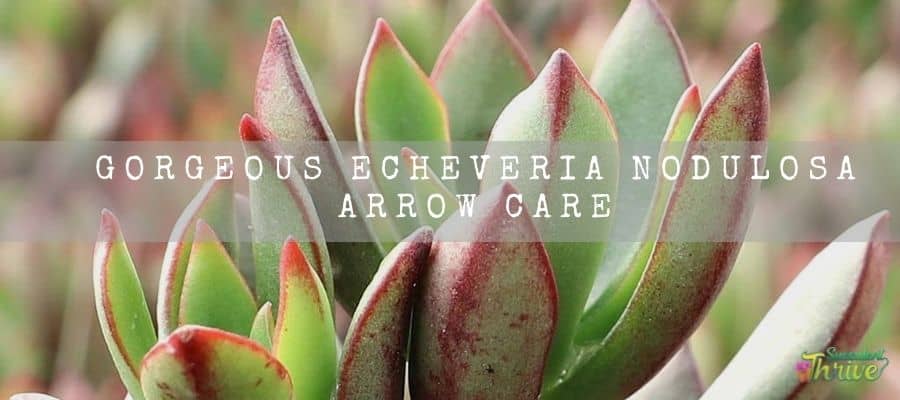Echeveria nodulosa arrow is a super cool fun cultivator which you may come across in the Echeveria plants. They are well known for their slender upright pointed shaped leaves.
In addition to that if you wish to add some contrast and texture for your indoor garden, Echeveria nodulosa arrow would be the one to try out.

Echeverias are not fuzzy plants as they would require only an easy maintenance from you. They are endemic plants to Mexico and related to the Echeveria nodulosa plants.
So, this guide will cover everything you should be aware of when cultivating them. Starting from how you should expose them to sunlight to correct watering methods etc.
In addition to that, we will also be covering the bugs and common issues they may come across as well. So, let’s begin to discover about these precious plants.
How do I identify the Echeveria nodulosa arrow?
Echeveria nodulosa arrow usually come up with slender leaves. The leaves would be pointed in shape and tend to grow in an upright manner.
Overall, these plants would tend to take an olive-green base tone. Furthermore, they would comprise burgundy lines and freckles which would be unique for themselves.
They would naturally come up with tall stems. The exposure for full sunlight would cause vibrant colors in them.
Literally bright sunlight would help them to develop red margins and a stripe right in the center of the leaves. Echeveria nodulosa arrow rosettes would form in a loose manner.
They would bear flower blossoms in coral pink and yellow during summer. They would arise right on top of the stall stems. These plants would usually be medium sized. To be more precise, they would reach a maximum height of about 3-5 inches.
Size of the plant
Echeveria nodulosa arrow would grow up to a maximum height of 3-5 inches.
Growth rate
Echeveria nodulosa arrow are growing at a moderate pace.
One look care guide
| Botanical Name | Echeveria nodulosa arrow |
| Plant Type | Succulent |
| Mature Size | maximum height of 3-5 inches. |
| Sun Exposure | Full sunlight / partial shade |
| Soil Type | Well draining |
| Soil pH | Neutral |
| Bloom Time | Summer |
| Flower Color | coral pink and yellow |
| Hardiness Zones | USDA zone 10 ( 30 degrees Fahrenheit). |
| Native Area | Mexico |
| Toxicity | Non toxic |
| Average price | 9 USD |
How do you take care of the Echeveria nodulosa arrow?
Looking after the Echeveria nodulosa arrow is not a complicated process at all. However, you still need to do it with some care and attention.
Echeveria nodulosa arrows are low maintenance plants and all you need to do is provide the basic care treatments for them.
Light Requirement
Echeveria nodulosa arrow would want to have full sunlight in the morning hours to grow vigorously. Furthermore, they can withstand partial shade during the afternoon hours.
So when you grow them outdoors you should go ahead and select a place where they will be secured from intense sunlight.
They would prefer to have full sunlight in the morning as well. if you end up exposing them to full sunlight right throughout the day, it will cause scorching of the plants. Furthermore, it would also make the plants leaves bleach out its colors too.
Echeveria nodulosa arrow plants would perform well closer to a bright sunny windowsill when you cultivate them indoors.
If you feel like the plants are still lacking ample sunlight, you can consider placing grow lights to enhance the lighting conditions.
Echeveria nodulosa arrow are susceptible for sunburns and if you expose them to direct sunlight for extended periods it would result in unnecessary problems such as sunburns.
If you have cultivated them indoors for some time and want to bring them outdoors, you can expose them to bright sunlight in a gradual manner where you allow some time for the plants to get used to those Conditions.
Unless you expose them for full sunlight at once, it will also contribute for sunburns.
Temperature and humidity
Echeveria nodulosa arrow would want a temperature range of around 65 degrees to 72 degrees Fahrenheit. Colder temperatures would not be healthy for them.
if you had mistakenly exposed them to frost, you could see how they start to suffer from frost damage. If you had placed the plants outdoors and if the temperature is supposed to drop to 50 degrees and below, I suggest you bring them indoors during winter.
Humidity wise, they would prefer to have 50 % humidity levels. Exposure for high humidity levels would be unhealthy on the plants. If you think there is less humidity around the plants, you may consider misting them.
Is it cold hardy?
Echeveria nodulosa arrow are not the type of plants which would withstand a hard frost. Hence, you can presume that these are not cold hardy plants.
Growth Zone
Echeveria nodulosa arrow would grow to their best if you grow them in USDA hardiness zone 10 ( 30 degrees Fahrenheit).
Watering Requirement
Echeveria nodulosa arrow are a set of succulents which would thrive well with minimum water when compared with other plants. In other words, you need to water them less often.
Literally you can water them once every one or two weeks during their active growing pace whereas you can limit watering them once every month during winter. Echeveria nodulosa arrow have quite sensitive roots which would contribute to root rot if you over supply water.
Best is to allow the soil to wither between two watering sessions and then resume watering them. However, never leave the soil to be bone dry too.
Furthermore when you water them, make sure that you don’t spill any water on the leaves as if you let any excess water to be on the leaves for too long it would also pave the way for rot.
Soil Requirement Type / pH
Echeveria nodulosa arrow adapted to grow in hot and arid conditions. So, you need to mimic the same conditions in cultivation as well.
Ideally you should go for a well-draining soil mix which will not hold onto excess water for too long. As said in the above, too much water would cause rot or in the wilt of the plants.
What people generally do is they go for cactus and succulent soil mixes as they are fast draining and well aerated too.
You can grow Echeveria nodulosa arrow in any potting mix as long as they are well draining. That being said, the ideal soil mix would be a cactus or succulent soil mix.
You can easily find them in garden stores or even in nurseries. You can go ahead with a mix of sand and potting soil for this purpose too as sandy soil is also well draining..
Pot size Potting and Repotting
I encourage you to use porous pots to grow these plants. For example, you need to go ahead with either clay pots or with terra cotta pots.
Do not use plastic pots as they would retain excess water which would lead to rotting. The porosity level is very low in plastic pots. If you can’t find porous pots, you may grow them outdoors.
Further I also encourage you to add some gravel in the pots as it would improve the draining. If you use shallow pots, you can move them in and out very easily.
When it comes to repotting you could do that when they start to actively grow which could possibly either spring or early summer.
Where to Plant
Echeveria nodulosa arrow have a strong demand for sunlight. So, choose a spot where they can absorb sufficient sunlight.
Fertilizer and time of year
Echeveria nodulosa arrow do not require fertilizers on a frequent basis. However it would be better if you could feed them with a diluted liquid fertilizer when they are actively growing .
It would give them the extra boost to grow vigorously. You can feed them once every other week. You may mix the diluted liquid fertilizer in a container and then apply.
If not, you may add it on the soil also. Just like overwatering, make sure that you don’t overfeed them too. On another note, you need to water them right after you feed them so that it would wash away the surplus.
Flower
Echeveria nodulosa arrow would blossom with coral pink and yellow during summer.
Dormancy
Echeveria nodulosa arrow are winter dormant plants.
Toxicity
Echeveria nodulosa arrow are nontoxic plants for both pets and for kids as well.
Common bugs and illnesses
Echeveria nodulosa arrow may have to battle with pest attacks from mealybugs, spider mites’ aphids and from fungus gnats occasionally.
Out of all these, mealybugs could be the biggest invader for these plants. They can infest the plants rapidly and multiply rapidly too.
They would usually suck the sap out of the plants. On the other hand, spider mites may tend to feed on the leaves of the plants. further they may spread virus attacks as well.
Aphids would consume the young shoots of the plants which would ultimately result in stunt growth of the plants.
Furthermore, they can also contribute to the transmission of lace bugs which would deform the plants. Lastly fungus gnats would tend to lay eggs in moist soil.
Once they hatch, their larvae would end up eating the plant’s roots which would ultimately result in the death of the plants.
So, whenever you come across any situation like this, you need to first quarantine the plants so that you can avoid any further spread of these among the rest of other plants. Next, remedy them with appropriate fungicides.
Last but not least, you need to watch out for root rot especially if you supply them water in excess. This is a commonly spotted disease not only among echeverias but also among all other succulents. If you had grown them in a poor draining soil mix it would also lead to this condition.
Special Care tips
Echeveria nodulosa arrow are low maintenance plants. So, if you spot any decaying older plant parts, you need to prune them so that the plants would look nicer.
How to propagate Echeveria nodulosa arrow
You could propagate the Echeveria nodulosa arrow by using either the stem cutting method or the leaf cutting method.
Echeveria nodulosa arrow benefits
Echeveria nodulosa arrow plants would look great in planters which you can place them in patios, porches etc.
Conclusion
Echeveria nodulosa arrow are some exciting plants to have and they will amaze you with their super cool flower blossoms during their flowering season.
Above all, they require easy maintenance and supervision from you and if you ensure that you fulfill their main growing needs, they will flourish.
Read Next : Mammillaria Gracilis | Unmistakable Cactus |
